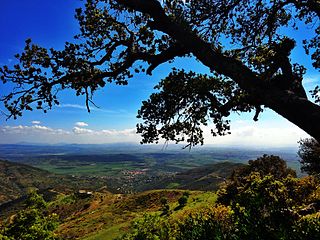
Kabylie is a cultural region natural region, and historical region in northern Algeria. It is part of the Tell Atlas mountain range, and is located at the edge of the Mediterranean Sea.

Sliven is the eighth-largest city in Bulgaria and the administrative and industrial centre of Sliven Province and municipality.
In Algerian politics, the term Kabylist may be used to refer to Kabyle nationalist parties, such as the MAK, which support self determination for Kabylie, or argue that the Kabyles constitute a people unto themselves and distinct from other Algerians.

Berberism or Amazighism is a Berber political-cultural movement of ethnic, geographic, or cultural nationalism, started mainly in Kabylia, Algeria and in Morocco, later spreading to the rest of the Berber communities in North Africa. A Berber group, the Tuaregs, have been in rebellion against Mali since 2012, and established a temporarily de facto independent state called Azawad, which identified itself as Berber.
Brahim Zafour is a former Algerian football player.
The Arouch Movement or Berber Arouch Citizens' Movement is an organization in Algeria representing the Kabyle people, a Berber group of the province of Kabylie. Their name, Arouch, is the plural form of the word Arch, referring to a traditional Kabyle form of democratic political assembly. The movement was started after the Black Spring disturbances in 2001, in which 126 Kabyle protesters were killed by Algerian gendarmes. The Arouch have a horizontal leadership and it has no leader, although charismatic arouch representatives like Belaïd Abrika have emerged.

Yambol is a city in southeastern Bulgaria and administrative centre of Yambol Province. It lies on both banks of the Tundzha river in the historical region of Thrace. It is occasionally spelled Jambol.
The Berber Spring was a period of political protest and civil activism in 1980 claiming recognition of the Berber identity and language in Algeria with events mainly taking place in Kabylie and Algiers.

Jeunesse Sportive de Kabylie, known as JS Kabylie or JSK, is an Algerian football club based in Tizi Ouzou. The club are named after the cultural, natural and historical region that is home to the Berber-speaking Kabyle. The club was founded in 1946 and its colours are green and yellow. Their home stadium, Stade du 1er Novembre 1954, has a capacity of 18,000 spectators. The club is currently playing in the Algerian Ligue Professionnelle 1.

Kabile, Cabyle, or Kabyle is a village in southeastern Bulgaria, part of the Tundzha municipality, Yambol Province.

The Black Spring was a series of violent disturbances and political demonstrations by Kabyle activists in the Kabylie region of Algeria in 2001, which were met by repressive police measures and became a potent symbol of Kabyle discontent with the national government. The protests took place against a backdrop of long-standing cultural marginalization of the Highlander Kabyle, a homogeneous Berber linguistic group in Algeria despite the most rigid government-sponsored Arabization measures of the 1960s through the 1980s having been lifted. The name "Black Spring" alludes to the events known as the Berber Spring of the 1980s, in which mainly Kabyle civil society activists challenged the ban on Berber culture then in place, demanding cultural rights and democracy.
The Berber Latin alphabet is the version of the Latin alphabet used to write the Berber languages. It was adopted in the 19th century, using varieties of letters.

The Movement for the autonomy of Kabylie is a non-violent autonomist Kabyle political organization seeking self-government rule for the province of Kabylie in Algeria. It was founded by the folk singer Ferhat Mehenni, now President of The Provisional Government of Kabylie in exile, after the "Black Spring" disturbances in 2001.

The national park of Djurdjura is one of the national parks of Algeria. It is located in Kabylie and is named after the Djurdjura Range of the Tell Atlas.

The Bibans or Biban Range are a chain of mountains in northern Algeria, bordering the south of Kabylie.

Beni Ourtilane is a town and commune in Setif Province, Kabylie in north-eastern Algeria.
The Igawawen or Gawawa were a confederation of Kabyle Berber tribes in Algeria. The Arabs called them Zwāwa. The Arabic term Zwāwa had been previously used to refer to Kabyle fighters rather than the Igawawen in particular, and it is unclear if the original meaning of the term was ethnic.

The Kabylie flag is a cultural and national flag proposed for the Kabyle people, a Berber ethnic group native to Kabylia in northern Algeria. It is composed of five horizontal stripes. In the centre, the flag is charged with a green letter Z in the Tifinagh alphabet (ⵣ), which represents the Berber resistance, freedom and the Kabyle language.
This page is based on this
Wikipedia article Text is available under the
CC BY-SA 4.0 license; additional terms may apply.
Images, videos and audio are available under their respective licenses.












